Get a glimpse of eight dairies that excel in a variety of farm aspects including genetics, technology, community engagement, environmental stewardship, cow comfort and melding multiple generations. The virtual farm tours will also highlight a variety of sizes, locations and dairy breeds. They are each led by the respective farm’s owner or manager, and questions are encouraged.
Below is the list of this year’s virtual farm tour lineup:
TUESDAY, OCT. 1
2 p.m.
Hosted by: Kieler Farms Inc., Platteville, Wisconsin
Highlights: 1,800 milking/labor efficiency
Sponsored by: GEA
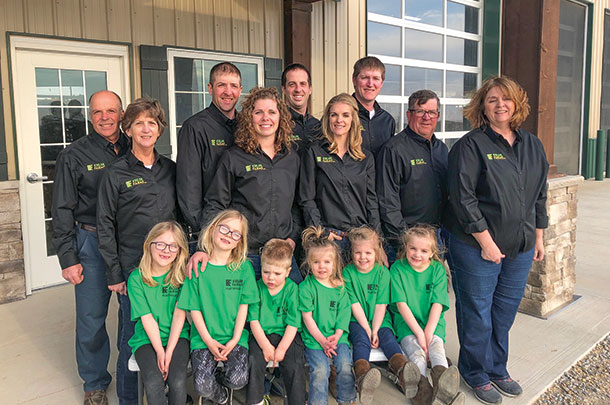
For 72 years, the Kieler family has focused on caring for their land, animals and employees in Platteville, Wisconsin. Kieler Farms utilizes a new, 50-stall GEA rotary parlor equipped with FutureCow automated teat prep and Apollo post-dipping systems to efficiently milk their herd. This new parlor technology has allowed the Kielers to keep the same number of employees while tripling their herd size to 1,800 cows.
Primarily consisting of Holsteins with a few Brown Swiss and Red & White cattle, the herd maintains a 91-pound daily milk production average with 3.65% fat and 3.05% protein, along with 95,000 somatic cell count (SCC). The farm features a cross-ventilated freestall barn for the milking herd with a combination of individual hutches, group housing and freestall facilities to care for the heifers. Kieler Farms is owned and operated by nine members of the Kieler family and includes 3,500 acres of farmland.
The Kielers are committed to the success of their community through involvement with local FFA chapters and town boards, the Platteville Chamber Ag Tourism Committee, Grant County Dairy Promoters, Dairy Farmers of Wisconsin and the Premier Co-op board of directors. The farm has been awarded an honorary chapter degree from Platteville FFA, the 2017 Business Asphalt Award for advancing innovation in asphalt pavements and the Arthur J. Virtue Award for outstanding contributions in the field of agriculture.
WEDNESDAY, OCT. 2
12 p.m.
Hosted by: Moo-Riah Dairy, Melba, Idaho
Highlights: 1,250 milking/community engagement
Sponsored by: Quality Liquid Feeds Inc.
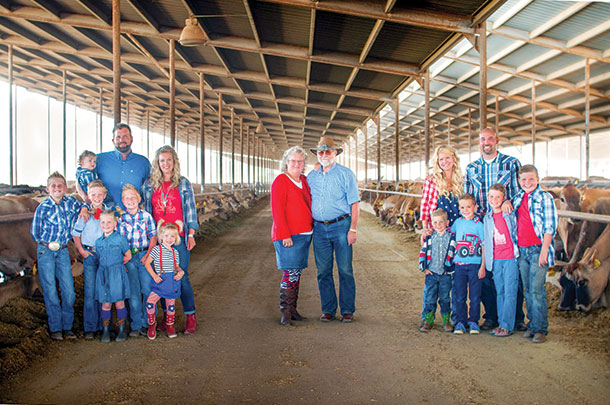
Founded in 1999, Moo-Riah Dairy in Melba, Idaho, was built by Bert and Trina De Winkle and their six children, of which Rudi and Anne-Marije De Winkle and Justin and Siska Reece are still involved today. Home to 1,250 head of Jersey milking cows, Moo-Riah Dairy maintains a 55-pound-per-day actual tank average with 5.25% fat and 3.9% protein due to a focus on feeding strategies and efficiencies with Rudi as the nutritionist.
The cows are milked in a double-20 parallel parlor, equipped with Afimilk meters, sort gates and pedometers for all cows. To manage their manure, the farm utilizes a separation pit, settling ponds, two lagoons, two mechanical separators and two composting facilities. Moo-Riah Dairy also consists of 360 acres of corn, triticale and alfalfa managed by Bert and Justin.
The entire family is very involved within their communities and the dairy industry. Bert volunteers with Love In the Name of Christ, and Trina has served on the DFA board and currently volunteers with Love Inc. as well as serves on the board of Arrow Homeschool Co-op. Rudi is an FFA and 4-H volunteer and board chair of Grace Bible Church and Love Inc. He also serves on the IDEAL board for Idaho Dairymen’s Association. Siska is a graduate of Leadership Idaho Agriculture, an ambassador for Dairy West, and co-founder/board chair of Arrow Homeschool Co-op. Justin and Siska soon plan to promote the dairy industry with their four boys through an agritourism program focusing on showcasing dairy products, animal welfare, environmental stewardship and commitment to safe milk.
WEDNESDAY, OCT. 2
2 p.m.
Hosted by: Aurora Ridge Dairy, Aurora, New York
Highlights: 2,075 milking/genetics
Sponsored by: Semex
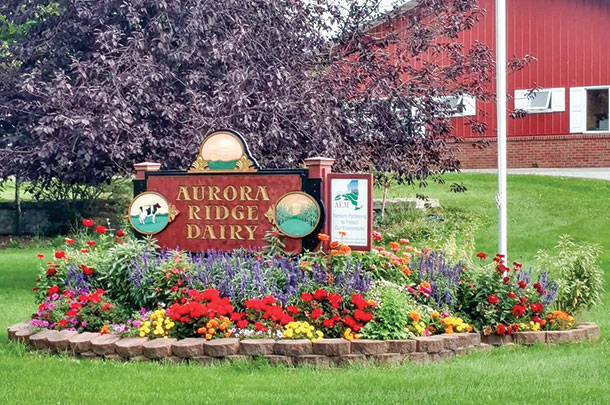
Aurora Ridge Dairy in Aurora, New York, is home to a milking herd of 2,075 registered Holsteins milked three times a day in a double-28 herringbone parlor equipped with Afimilk. The farm began in 1985 with 65 cows and 35 heifers. Through continuous internal growth and construction of new facilities that include multiple six-row freestall barns, they have grown the herd to its current size.
The milking herd at Aurora Ridge Dairy maintains a 30,065-pound rolling herd average with 3.9% fat and 3.1% protein. Using separated solids from the methane digester for milking cow, dry cow and youngstock bedding, the farm maintains an SCC between 110,000 and 140,000. The methane digester also produces 600 kilowatts of power per hour, supplying 100% of the farm’s needs.
The entire herd at Aurora Ridge Dairy is genomic-tested, with the results determining the breeding program for each animal. The farm’s genetic plan includes in vitro fertilization, embryo transfer, sexed semen, beef semen and conventional breeding. Genetics from the herd are exported to Japan, Germany and Canada, and can also be found in A.I. stud company programs.
The farm has been awarded a Progressive Genetics Herd Award from Holstein USA, and dairy herd manager Dave Harvatine was recognized as a 2018 Holstein USA Distinguished Young Holstein Breeder. The farm is involved in the community, dairy organizations and participates in research conducted by Cornell University. Aurora Ridge Dairy is owned by partners Bill Cook, Jason Burroughs, Dave Harvatine and Dan Westfall.
THURSDAY, OCT. 3
12 p.m.
Hosted by: Albright Jerseys LLC, Willard, Ohio
Highlights: 650 milking/technology
Sponsored by: American Jersey Cattle Association
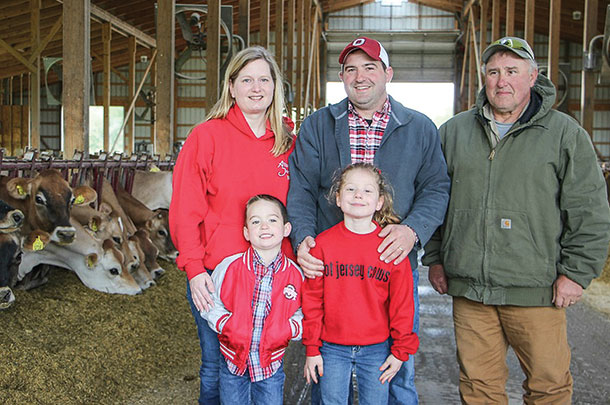
Fred and Becky Albright and their son Joel embrace new technology to remain profitable at Albright Jerseys LLC in Willard, Ohio. Founded in 1947 by Fred’s father, Allen, the farm has transitioned from a stanchion barn to a double-four parlor in the ’70s to an expanded parlor in the early 2000s to nine Lely A4 robots in 2018. During the most recent changes, Albright Jerseys increased their herd size from 340 to 650 cows, internally, in just six years.
The breeding philosophy of this commercial dairy is on profitable cows based on production and health traits. This is accomplished using genomic young sires on the top 50% of the herd, with the bottom half receiving beef semen. The success of this practice at Albright Jerseys is seen in the rolling herd average of 20,443 pounds of milk with 4.6% fat and 3.7% protein along with top-ranking Jersey Performance Index cows, numerous awards for milk production in Ohio and the U.S., and recognition in 2016 as the American Jersey Cattle Association’s Young Jersey Breeder.
Prior to the 2018 robot installation, Joel was working full- time at the dairy and full-time as a vocational agriculture teacher for 17 years. During that time, he was extremely dedicated to his Crestview FFA chapter, along with the Ohio FFA Association. Once the robots were installed, he made the decision to focus on the profitability of the dairy and utilizing technology to improve the quality of life for all involved with the operation.
THURSDAY, OCT. 3
2 p.m.
Hosted by: Richland Dairy, LLC, Kenyon, Minnesota
Highlights: 115 milking/technology
Sponsored by: Lely
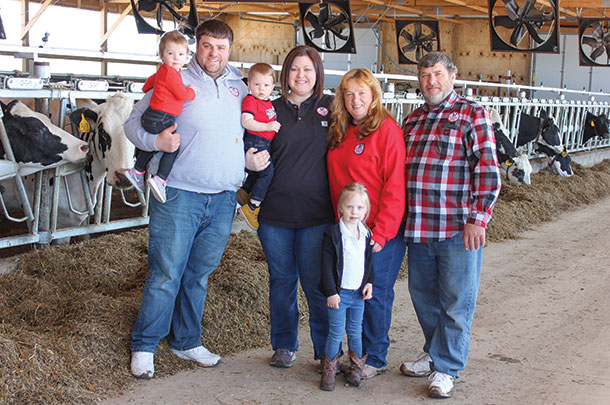
Richland Dairy of Kenyon, Minnesota, operated by Alan and Sharon Meyer and their son and daughter-in-law, Andy and Samantha, and family, were early adopters of automatic milking systems, installing their first two Lely A3 Next automatic milking systems back in 2010. However, tragedy struck when a tornado, in September 2018, destroyed several buildings on the dairy, including the robot room and freestall barn.
They had a minimal number of animals that were lost, but difficult decisions had to be made. With a desire to continue dairy farming and providing this way of life for their families, the Meyers opted to install two Lely A5 robots and were back milking a short three-and-a-half months later.
The robots have granted the Meyers an enhanced work-life balance, while running nearly 700 acres of owned and rented land. Crops grown include corn, soybeans, alfalfa and small grains. The 115-cow milking herd boasts a 28,500-pound rolling herd average, with components of 3.9% fat and 3.1% protein. Maintaining and enhancing the land for future generations is important to the Meyers, as recognized by the 28 basins throughout their acreage to reduce soil loss. In addition, they recently started using cover crops and a no-till management program to further reduce their impact on the land.
FRIDAY, OCT. 4
12 p.m.
Hosted by: Ratliff Jerseys, Garnett, Kansas
Highlights: 55 milking/genetics
Sponsored by: Kansas Department of Agriculture
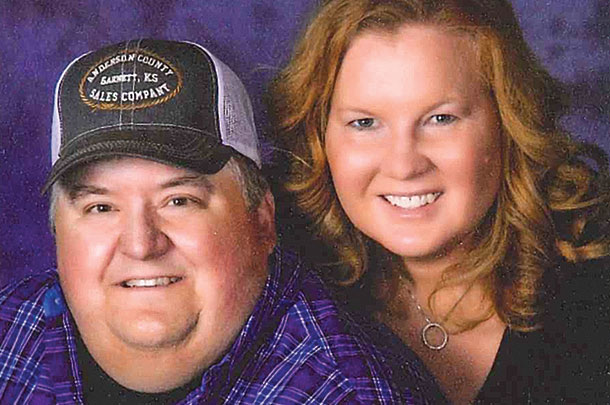
Ratliff Jerseys of Garnett, Kansas, is known around the world for its Jersey cattle genetics. For two decades, the team at Ratliff Jerseys, Christy and Ron Ratliff and Christy’s brother Mike Kennedy, have been breeding show-winning cattle in the heart of Kansas. Currently cared for in a pack barn with a robotic feed pusher, the 55-cow herd is milked in a double-four herringbone parlor twice a day and has a rolling herd average of 19,695 pounds of milk with 5.4% fat and 3.7% protein.
As a nine-time WDE Premier Breeder and four-time WDE Premier Exhibitor, Ratliff Jerseys has made a significant impact in the show ring at World Dairy Expo and other national and state shows throughout the country and world. Many notable cow families have called Ratliff Jerseys home, including well-known animals such as Ratliff Price Alicia, Ratliff Minister Porscha, Ratliff Sambo Martina, Arethusa Primetime DeJaVu and many others. The top cattle at Ratliff Jerseys are involved in an intensive embryo transfer program that includes the farm’s 150-head beef herd as recipients.
The Ratliffs are members of the REAP program, former recipients of the DFA Milk Drop Quality Award, the 2010 Kansas Distinguished Dairy Family and the American Jersey Cattle Association’s 2018 Master Breeder, which came just a decade after Christy was recognized with the association’s Young Jersey Breeder Award. In 35 years, Christy has bred more than 175 cows appraised at Excellent-90% or higher.
FRIDAY, OCT. 4
2 p.m.
Hosted by: Paulus Dairy LLC, Fredonia, Wisconsin
Highlights: 1,550 milking/environmental stewardship
Sponsored by: Select Sires Inc.
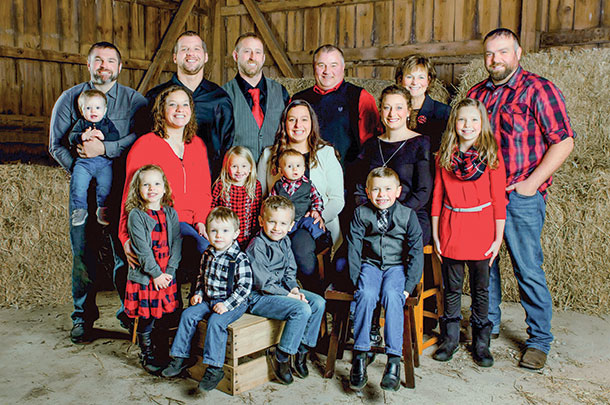 Be
Be
ginning in 1975 as a traditional 35-cow herd in a stanchion barn to building two freestall barns and a double-20 parallel parlor to accommodate the 1,550 cows currently in the milking herd, Paulus Dairy LLC in Fredonia, Wisconsin, has seen a lot of changes. Owned by Mike and Lori Paulus, their son Andy and daughter, Tiffany Schneider, Paulus Dairy LLC has grown most recently through the acquisitions of five different herds. This has led to a focus on improving the genetic potential of the herd by working with a mating specialist to select the right bulls and breeding the lower cows to Angus.
As a family farm, people and community are at the heart of Paulus Dairy. A founding member of the Milwaukee River Watershed Clean Farm Families group, Paulus Dairy strives to minimize its environmental impact. The organization works with the Milwaukee River Watershed Conservation Partnership to provide a platform for producers and landowners to share ideas, concerns, priorities and lessons learned about agricultural conservation efforts within the Milwaukee River Watershed.
For 15 years, the farm has hosted and provided animals for a 4-H group, and Lori was a 4-H leader for 30 years. Lori is also a church trustee. Mike is a former board member of East Central/Select Sires and Select Sires and a current board member of the local cooperative. Andy was also on the board of directors for East Central/Select Sires. Tiffany practiced as a large-animal veterinarian for over five years before coming back home during the expansion.
SATURDAY, OCT. 5
12 p.m.
Hosted by: Fischer Clark Dairy, Hatley, Wisconsin
Highlights: 911 milking/cow comfort
Sponsored by: Allflex Livestock Intelligence
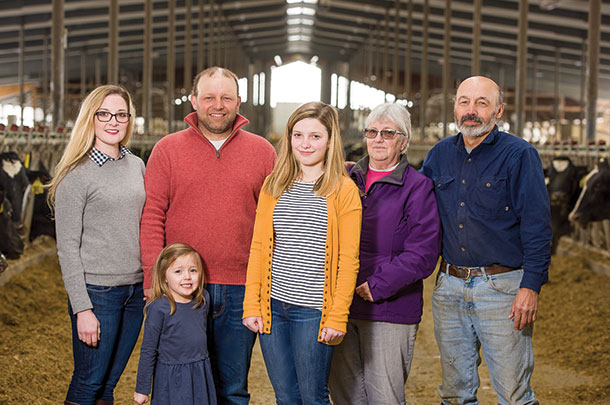
Mike and Sue Fischer of Hatley, Wisconsin, founded Fischer-Clark Dairy Farm Inc. in 1972 with eight cows. Today, in partnership with their son, Jon, and his wife, Heidi, the family cares for a milking herd of 911 Holsteins in a double-20 parlor. The cows at Fischer-Clark Dairy maintain a rolling herd average of 32,651 pounds of milk, 4.25% fat and 3.25% protein, all while averaging a somatic cell count below 100,000 during each month of 2018. These high components garnered the Fischer family Sartori Cheese Yield Awards in 2016, 2017 and 2018.
The facilities have continuously been updated to match the growth patterns of Fischer-Clark Dairy. Most recently, this included the construction of a tunnel-ventilated barn to complement the existing naturally ventilated barn that now both house milking cows. A new heifer facility was constructed in 2012 and then expanded in 2015 in preparation for the latest milking herd growth in 2016. The youngstock facilities also include a monosloped, four-row barn built in 2017 to accommodate 128 individual pens and a second structure built in 2018 to house calves post-weaning and before they are moved into the established facility at 75 days old.
Like many farms, environmental efforts are important to Fischer-Clark Dairy. They prioritize soil conservation using strip-till and no-till methods along with precision technology to micromanage additional nutrients. The family is also involved in their community, as Heidi gives her time as the co-general leader of their local 4-H club, serves on the board of directors for PPA, serves on the Edge Policy Committee and is vice president of her church council. Mike and Sue are also very involved with their church; Sue coordinates music for Sunday masses, and Mike teaches catechism, serves on the church council and is involved with the Rural Life Committee. ![]()
PHOTO 1: The Kieler family and their 50-stall rotary milking parlor will be featured on Tuesday, Oct. 1, at 2 p.m.
PHOTO 2: Moo-Riah Dairy will take the stage at noon on Oct. 2 to share how they manage their high-component Jersey herd.
PHOTO 3: Aurora Ridge Dairy will discuss their strategy for achieving top genetics on Oct. 2, at 2 p.m.
PHOTO 4: On Oct. 3, the Albrights will discuss how they’ve adopted technology to grow and milk their 650-cow Jersey herd.
PHOTO 5: On Oct. 3 at 2 p.m., Richland Dairy will discuss how they rebuilt a tornado-damaged robot barn in just three-and-a-half months.
PHOTO 6: Nine-time WDE Premier Breeder and four-time WDE Premier Exhibitor Ratliff Jerseys takes the stage at noon on Oct. 4.
PHOTO 7: At 2 p.m. on Oct. 4, Paulus Dairy will explain how they have made environmental stewardship a priority while growing their dairy to its present size of 1,550 cows.
PHOTO 8: Fischer Clark Dairy will also detail their story and tell how they’ve improved barns and heifer housing. Courtesy photos.







